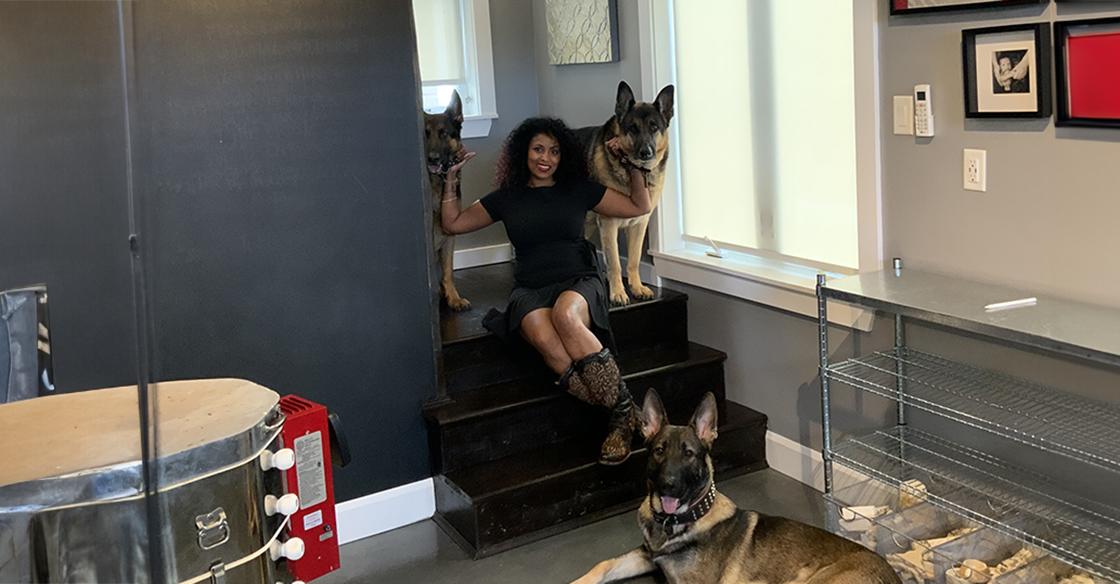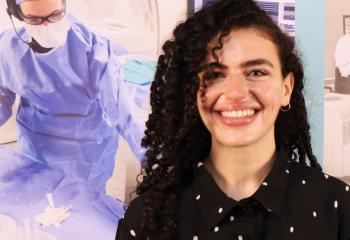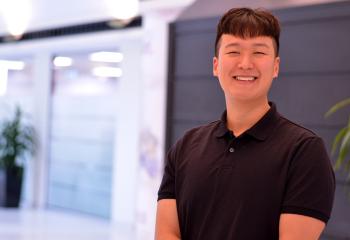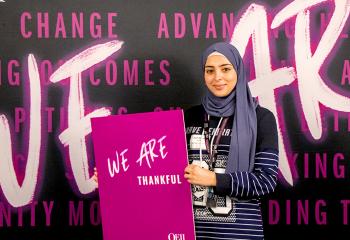
Lynette Peters, PhD student and recipient of QEII Foundation Diversity in Health Care Bursaries in 2022 and 2023, is working to understand the connection between the creative arts and Canadian Armed Forces veterans reintegrating into communities following a life of service. Lynette works with veterans and civilian first responders at her pottery studio, Cerberus, named after a three-headed dog in Greek mythology. (Photo credit: Contributed)
Lynette Peters isn’t what most people envision as a typical student. A 43-year-old mother of five, Lynette is working on a PhD in Health at Dalhousie University.
In 2022 and 2023, Lynette received QEII Foundation Diversity in Health Care Bursaries to support her education. Since 2018, the QEII Foundation has provided $329,000 in bursaries to students from historically marginalized populations studying in a health-related field.
Lynette’s interest in health started when she was a young child. Growing up in Ontario, her family doctor had a huge impact on her.
“He saw me as a person, not just some kid coming into his office,” remembers Lynette. “He always made me feel good about myself and I decided I wanted to be just like him.”
Lynette didn’t end up going to med school but she was offered an incredible opportunity to pursue a PhD.
Lynette likens her journey to a metamorphosis.
“I did an undergraduate degree in biology at Queen’s University; that’s where I got my wings,” explains Lynette. “Then I went to the University of Windsor to grow my interest in neuromuscular physiology; that’s where I learned how to use those wings.”
Now, working on her PhD in Health, Lynette says she’s “learning how to fly properly.”
Through her PhD, Lynette is working with Canadian Armed Forces (CAF) members and veterans, and civilian first responders, through her Cerberus Helmet Project. It’s believed that Lynette is the only one doing research of this kind, focusing on art without therapy.
Lynette’s journey began in 2016 when her husband, an injured CAF member, was released from the military. He was very unwell and Lynette was taking care of him and their family, all while trying to get into med school.
Military postings involve moving across the country, often away from systems of support such as family and close friends.
“As a military spouse, you learn very quickly how to adapt to change, function independently and to lead while military members are absent for training or deployment,” says Lynette.
Lynette is very proud of her ability to do so, as she says it’s often as a potential downfall when avoiding help or surviving difficult periods alone.
Lynette acknowledges she was at her tipping point in 2016, operating under the military adage ‘Keep Calm, and Soldier On.’
But stoicism can be problematic, she says. “We do not always know who is struggling.” This is a theme she tries to carry forward into her work.
To help alleviate some of her caregiver stress, Lynette and a friend signed up to take a pottery class together.
“I lived for these classes,” says Lynette. “They helped me feel hopeful and gave me the opportunity to remove myself from the stress of my life; all the lack of control.”
Lynette caught the “pottery bug,” putting her energy into learning everything she could. It wasn’t long before Lynette made the connection between her art and her background in science.
Lining up her pottery projects on the kitchen counter to survey her progress was a defining moment in Lynette's future.
While viewing her projects, Lynette’s husband had an idea.
“He looked at me and said, 'what do you think about a studio for veterans?’”
From there, the idea for her Cerberus studio was born. Lynette immediately started sketching a logo for Cerberus — a three-headed dog from Greek mythology.
Lynette explains that Cerberus guarded Hades Underworld and Hercules’ twelfth feat was to subdue Cerberus using only his hands and mind.
“As we align our modern-day warriors with Hercules, using one’s mind and hands is powerful in transition from military service or for anyone struggling through life’s challenges,” says Lynette.
It was a chance reconnection with Dr. Alice Aiken, vice-president of research and innovation and Dalhousie University, that set Lynette on the path for her PhD and provided her a platform to advocate for these services for Veterans through research.
“I’ve known Dr. Aiken since I was 19 years old; she knew about my med school aspirations and how hard I’d been working,” says Lynette. “She suggested I work with her on my PhD.”
When they talked about potential research projects, Lynette pulled out a research project she had sketched out when searching for funding and a lack of support that was related to a limited evidence base. She recalls folding it up and hoping that she could use it if ever she made it to a med school interview for a possible research-in-medicine project. The rest, as they say, is history.
In her first year of PhD at Dalhousie, Lynette developed the Cerberus Helmet Project, providing no-cost access to creative expression through pottery lessons. Using unserviceable CAF helmets as moulds for clay, participants design their own creations — a part of their transition journey to reconnect with who they were and who they want to be.
“The military population is special,” says Lynette. “Their health is reflective of their service for our country and it's a lifelong impact.”
Lynette’s research is focused on understanding the impact of creative arts on CAF veterans as they move through their transition from active service to reintegrating into communities.
Receiving the QEII Foundation’s diversity bursary provided Lynette with a financial boost for her academics and research. It also had a profound impact on her, personally.
“Receiving this bursary means the world to me,” says Lynette. “It sends a very strong signal that I matter, that students matter and student work matters. This recognition is extremely meaningful to myself and to my entire family.”
“The QEII Foundation and their donors are investing in people. Not only the person receiving the bursary but the thousands of people who may receive care from that person in the future.”
To learn more about the QEII Foundation Diversity in Health Care Bursaries, visit QE2Foundation.ca/Diversity.


